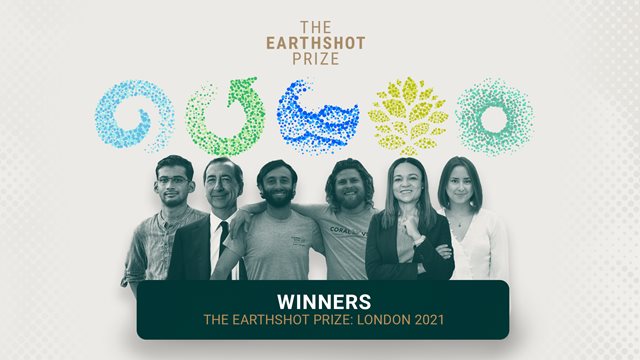
Date: 20 Oct 2021
Inaugural Earthshot Winners Announced in London
The inaugural Earthshots Ceremony took place on 17th October, 2021 in London. This new global environment prize is designed to incentivise change and help repair our planet over the next ten years and aims to turn the current pessimism surrounding environmental issues into optimism, by highlighting the ability of human ingenuity to bring about change, and inspiring collective action.
The five categories are underpinned by worldwide climate initiatives such as the UN Sustainable Development Goals and assist in creating a more prosperous climate by 2030. The five winners of the Earthshot Prize receive a generous £1 million to scale their ideas and drive climate action to protect our beautiful planet. Shortlisted nominees will also be given tailored support and opportunities to help scale their work, including being connected with an ecosystem of likeminded individuals and organisations.
A full overview of Earthshot winners and finalists can be found HERE and an overview of the winners of each category is provided below.
Protect and Restore Nature
The Republic of Costa Rica was the winner due to its efforts to protect forests, plant trees and restore ecosystems by paying citizens to care. From the destruction of the 1990’s, Costa Rica lost half its forests. However, with the sheer dedication of the nation’s people, the number of forests doubled in size. Flora and fauna thrived which led to a boom in ecotourism, contributing $4 billion to the economy. Costa Rica serves as a prime example that a united population with a shared vision can have marvelous results.
More information on this project can be found HERE
Clean our Air
Takachar is a social enterprise established by Vidyut Mohan from India which aims to reduce the effects of agricultural waste and its role in air pollution. For context, there is $120 billion of agricultural waste generated each year playing a devasting part on the air we breathe and the environment.
From witnessing first-hand in New Delhi, Vidyut envisaged a solution to combat this issue. His social enterprise, Takachar is a cheap, small-scale, portable technology that attaches to tractors in remote farms. The machine converts crop residues into sellable bio-products such as fuel and fertilizer.
Takachar’s technology reduces smoke emissions by up to 98% which will help improve the air quality that currently reduces the affected population’s life expectancy by up to 5 years. If scaled, it could cut a billion tonnes of carbon dioxide a year: a win for India’s farmers will be a win in the fight against climate change.
More information on this project can be found HERE
Revive our Oceans
Ocean warming and acidification are set to destroy over 90% of reefs by 2050, a death sentence for the quarter of marine life who need them to survive. Additionally, it will have terrible consequences for the billion human lives dependent on the benefits reefs provide.
Coral Vita, is a coral farm facility in the Bahamas created by Sam Teicher and Gator Halpern. The farms grow coral on land to replant in oceans, bringing new life to endangered ecosystems. This method allows coral to gow up to 50 times faster than traditional means.
The team at Coral Vita work with numerous stakeholders to improve education, open new job prospects, and construct a strategy to encourage more funding into environmental protection. Coral Vita benefits not just the oceans but coastal economies as well.
With Coral Vita’s methods, a single farm could potentially supply coral for an entire nation, and they ultimately envision a network of such farms in every nation with reefs.
More information on this project can be found HERE
Build a Waste-Free World
Milan, Italy was the winner of this category for its innovative food waste hubs in the city. Approximately one third of all food produced globally is wasted, accumulating between 25-30% of the world’s total greenhouse gas emissions.
Milan’s Food Waste Hubs tackle two serious issues simultaneously. First, waste it taken from supermarkets and companies’ canteens and given to NGOs who distribute it to the most deprived citizens. This project began in 2019 and aims to half the amount of waste in the city by 2030.
The Food Waste Policy is proving effective as the city has three Food Waste Hubs, each recovering about 130 tonnes of food per year or 350 kg per day, an estimated 260,000 meals equivalent. A simple model like this can easily be adopted by many if not all major cities across the world.
More information on this project can be found HERE
Fix our Climate
Enapter (Thailand/Germany/Italy) were the winners for their work on green hydrogen technology to alter our ways of living. AEM Electrolyser technology turns renewable electricity into emission-free hydrogen gas. Developed quicker and cheaper than once thought possible, the technology already fuels cars and planes, powers industry and heats homes.
By 2050, Enapter’s vision is to account for 10% of the world’s hydrogen generation. Renewable sources of energy such as AEM Electrolyser will play a significant role in preserving our climate for generations to come.
More information on this project can be found HERE